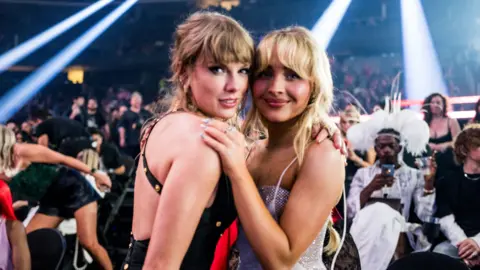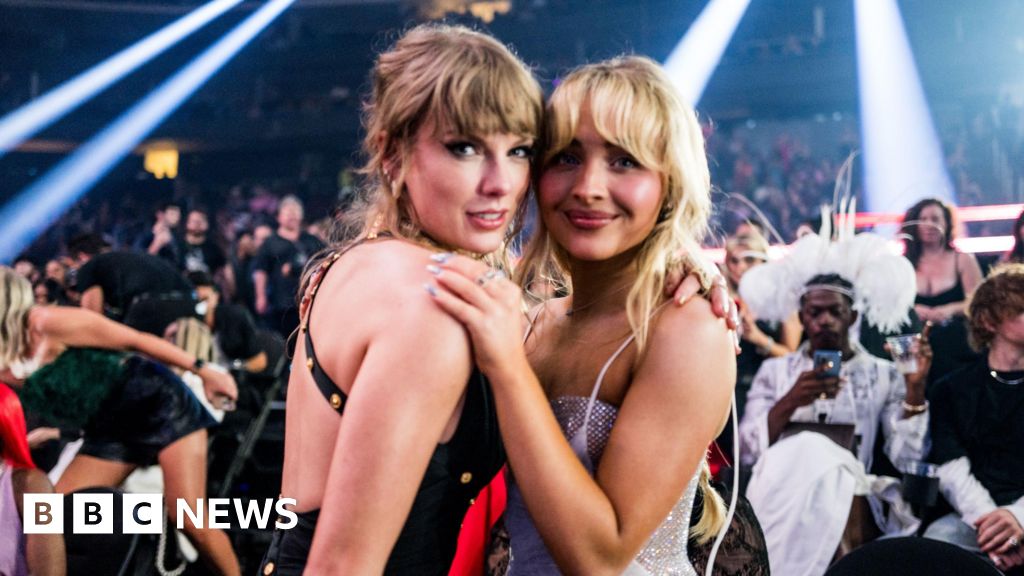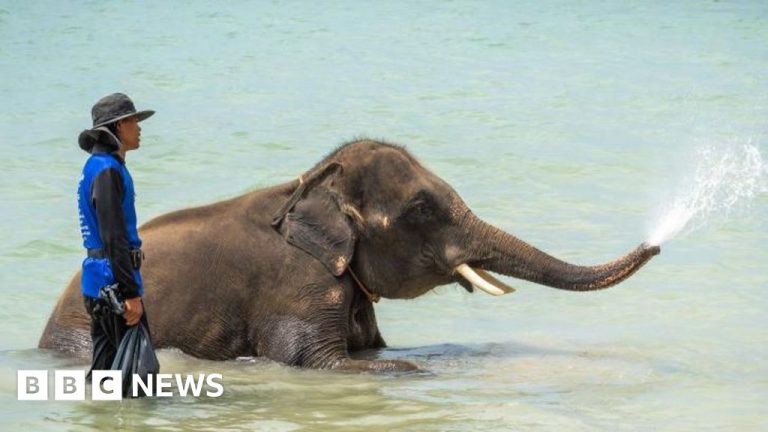 Getty Images
Getty ImagesFrom Taylor Swift to Charli XCX, women had a record-breaking year on the British charts, according to new figures from the British Phonographic Institute (BPI).
Female pop artists topped the singles chart for an unprecedented 34 weeks – the highest ever figure.
Twenty-one of those weeks belonged to Sabrina Carpenter, whose hit singles Espresso, Taste and Please, Please, Please dominated the second half of the year.
Women were also responsible for half of the year’s biggest-selling albums, with Taylor Swift’s Tortured Poets Department leading the pack.
A break-up album full of caustic kiss-offs and sober reflection, it accumulated more than 783,000 sales by the end of December – more than any artist has managed in a calendar year since Ed Sheeran’s ÷ sold 2.7 million copies in 2017.
Swift had another three albums among the year’s 20 biggest titles: 1989 (Taylor’s Version), Lover and Folklore.
There were also places in the year-end top 20 for albums Billie Eilish’s Hit Me Hard And Soft, Sabrina Carpenter’s Short N’ Sweet, Chappell Roan’s The Rise And Fall Of A Midwest Princess and Charli XCX’s Brat – all of which have been nominated for album of the year at the 2025 Grammy Awards.
Brat, whose brash and aggressive dance anthems became a cultural phenomenon, was also one of 12 albums by female artists to top the Official Albums Chart in 2024 (equalling a record set in 2023).
These included Prelude To Ecstasy, the debut album by BBC Sound of 2024 winners The Last Dinner Party; as well as new releases by Dua Lipa, Ariana Grande and Beyoncé.
Overall, music consumption in the UK rose by 9.7%, with fans buying or streaming 200.5 million albums (the BPI counts 1,000 streams as the equivalent of one album “sale”).
Streaming hit a record high, with 199.6 billion songs played over the course of the year.
That’s the equivalent of everyone in the country playing 2,920 tracks, or six continuous days of music, on services like Spotify, Apple Music and Amazon Music.
Vinyl sales marked a 17th consecutive year of growth, with 6.7 million records bought. And the decline in CD sales showed signs of slowing down, with purchases falling by just 2.9% to 10.5 million units.
 Kian Boyle / BBC
Kian Boyle / BBCHowever, the availability of millions of songs at the touch of a button is making it harder for British musicians to compete.
For the first time since records began in 1970, none of the year’s top 10 best-selling songs was by an artist from the UK.
Instead, the chart was dominated by US singer-songwriters, including Noah Kahan, whose breakthrough hit Stick Season notched up a total of 1.99m sales (including streams) over the year.
Benson Boone’s Beautiful Things took second place, while Sabrina Carpenter’s summer anthem Espresso came third.
The biggest-selling song by a Brit was Myles Smith’s folk-pop stomper Stargazing, which came twelfth.
BPI chief executive Dr Jo Twist acknowledged it was “undoubtedly becoming much harder” for British musicians to cut through in a “hyper-competitive global music economy”.
“British artists have perhaps enjoyed stronger years overall,” she told the BBC, “but plenty of UK talent ranging from Charli XCX, Dua Lipa, and Coldplay to The Last Dinner Party, Beabadoobee, and rising star Myles Smith, have had brilliant years.
“We shouldn’t forget that music is cyclical or that some of our major artists have not been active and can be expected to return in 2025 with new material.
“So I think we can be optimistic and look upon it as a ‘blip’ for now, but without becoming complacent.”
The BPI also noted that emerging music superpowers in Latin America and South Korea often receive government backing, and urged the UK to protect and support its own music industry.
In particular, it raised concerns over proposed changes to the UK’s copyright law, which it claimed “would allow international tech giants to train AI models on artists’ work without payment or permission”.
“The UK remains a world music power, but this status cannot be taken for granted,” said Dr Twist.
“We need a supportive policy environment that puts the focus on human artistry and enables continued investment in the next generation of British talent.”
























+ There are no comments
Add yours